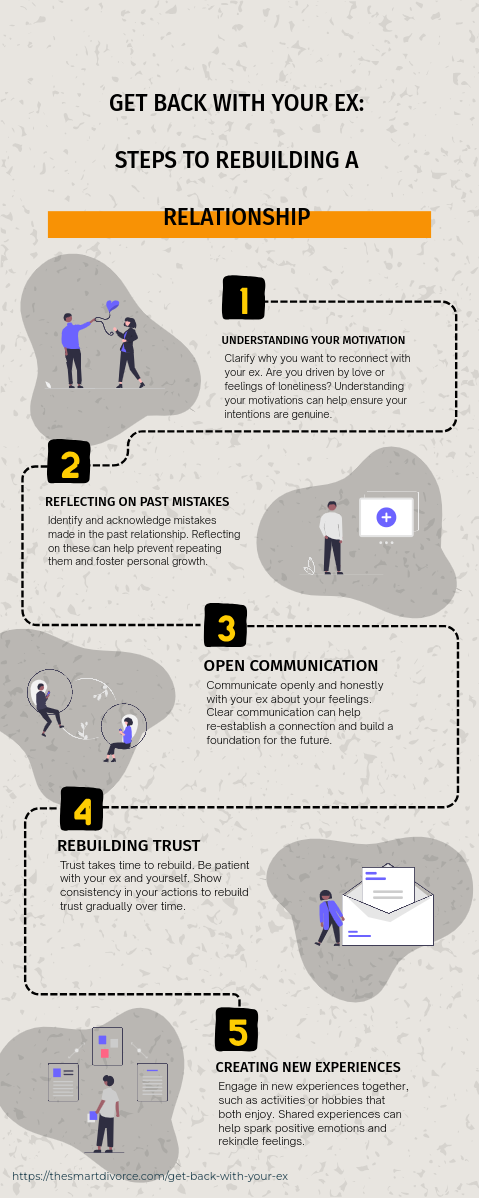When aiming to rekindle relationship with your ex, understanding attachment styles is a crucial step. This concept, which explains how we form relationships, plays a significant role in breakups and reconciliations. By understanding your own and your ex’s attachment style, you can effectively navigate the emotional challenges and significantly improve your chances to rediscover connection.
As a Divorce Coach and Certified Divorce Specialist, I’ve guided numerous clients in giving their relationships a second chance. By leveraging strategies based on psychological insights and personal growth, I’ve helped them navigate the complexities of getting back with their ex. In this post, we’ll explore how attachment science influences breakups, the importance of recognizing these patterns, and how a Divorce Coach can be instrumental in your journey of healing and reuniting with your ex.
What Are Attachment Styles?
Attachment theory was introduced in the 1950s and remains reliable for understanding relationships. Everyone has an attachment style, which influences how they connect with others. The three main styles are:
- Anxious-preoccupied: This person craves closeness but often fears rejection.
- Fearful-avoidant: They struggle with intimacy, wanting closeness but pushing it away.
- Dismissive-avoidant: They prioritize independence and often feel uncomfortable with emotional closeness.
Understanding your ex’s attachment style—and your own—can help you navigate the emotional landscape of getting back together. Whether you want to try again or have your ex back, this understanding is critical to building a new relationship that works better this time.
Why Attachment Styles Matter in Reconciliation
Your ex’s attachment style will likely influence how they behave after a breakup and how likely they are to give the relationship a second chance. For instance:
- Anxious-preoccupied exes may regret the breakup and quickly want to reunite.
- Fearful-avoidant exes may need more time and space before considering reconciliation.
- Dismissive-avoidant exes take longer to reconnect as they value their independence.
Personal Story: How Jessica and Her Dismissive-Avoidant Ex Got Back Together
Jessica came to me heartbroken after her former partner—who had a dismissive-avoidant attachment style—ended their relationship. Initially, she wanted to rush back, but I encouraged her to give him space. Six months later, her ex reached out, and they slowly began building a healthier relationship. This time, they took things slow, ensuring they understood one another’s emotional needs. Jessica’s story highlights that getting back together isn’t just about reconnecting—it’s about personal growth and understanding your partner’s attachment style.
How a Divorce Coach Can Help You Get Back with Your Ex
Working with a Divorce Coach provides emotional support, strategic advice, and guidance to repair broken relationship through the often tricky process of getting your ex back. Here’s how a coach can help:
Emotional Support for Healing
Breakups are tough, but healing is necessary to make the relationship work again. A Divorce Coach helps you manage the emotional rollercoaster, heal from heartbreak, and rebuild emotional strength. If you want your ex back permanently, this emotional healing is essential.
Strategic Communication
When trying to get back with your ex, and fix severed ties, how and when you reach out matters. A Divorce Coach helps you craft communication that resonates with your ex, whether they’re anxious, fearful, or dismissive. Understanding their emotional needs is the best way to reconnect.
Fostering Personal Growth
Many people focus solely on reuniting with their ex, but it’s equally important to focus on personal growth. Becoming a better version of yourself can inspire a stronger, healthier relationship the next time around. This journey of personal growth can be a source of inspiration and motivation as you work towards a successful reconciliation.
Creating a No-Contact Plan
The no-contact rule is often essential in getting your ex back, but the length of time depends on your ex’s attachment style. For example:
- Anxious-preoccupied exes: A short period of two weeks may be enough.
- Fearful-avoidant exes: They might need about 90 days before reconsidering the relationship.
- Dismissive-avoidant exes: They usually need at least six months of space.
This time apart allows you to reflect, heal, and determine if getting back together is correct.
Assessing Whether You Should Get Back With Your Ex
Before jumping into a reunion, assess your readiness and reasons for wanting to get back together. Are you seeking reconciliation because it’s what’s best for you both, or are you acting out of fear of loneliness?
Questions to Ask Yourself:
- Have I processed the breakup, or am I rushing back too soon?
- Am I seeking another chance with my ex for the right reasons, like love and mutual respect, or out of desperation?
- Have we both grown emotionally since the breakup, and can we reconcile to move forward together healthier?
When I worked with Sarah, she initially wanted to get back with her ex out of loneliness. After focusing on her personal development and reflecting on the relationship, she approached her ex from a place of strength. They both saw the changes they had made and were able to rebuild a more balanced relationship this time around.
Rebuilding Trust Through Communication
When you finally reconnect, rebuilding trust to repair broken relationship is essential for making the relationship work. Here are some critical tips for effective communication:
- Active Listening: Take the time to hear your ex’s thoughts and feelings.
- Be Honest and Clear: Be upfront about your feelings and intentions to avoid misunderstandings.
- Pay Attention to Non-Verbal Cues: Body language and tone often speak louder than words.
These strategies are essential to make the relationship work and build trust again.
Setting Boundaries to Make Things Work
Setting boundaries is critical if you want your relationship to succeed this time. Here are a few tips for establishing a healthier dynamic:
- Discuss Expectations: Ensure you’re both on the same page about what you want moving forward.
- Respect Personal Space: Give each other room to grow independently.
- Communicate Regularly: Keep the conversation going about any changes in your needs or expectations.
Setting boundaries helps you create a healthy relationship and avoid re-engaging in the same issues that caused the breakup the first time.
Personal Growth: The Key to Lasting Success
Personal growth is essential to reconnect with your ex and make the relationship work. Emotional independence, self-awareness, and healing allow both partners to build something new and healthier.
Personal Story: David’s Journey to Getting Back with His Ex
David initially came to me desperate to get back with his ex. Through coaching, he focused on personal growth, developing confidence and emotional strength. When he reconnected with his ex, she saw the positive changes and was open to giving the relationship another chance. This time, they built a more robust partnership based on mutual growth and understanding.
Final Thoughts
Reuniting with your ex isn’t just about rekindling old feelings. It requires emotional healing, personal growth, and effective communication to renew relationship. Reconciling with an ex is a process that takes time, whether it’s taking things slow or setting boundaries. You can approach it confidently and build a healthier, more robust relationship with the proper guidance.
At The Smart Divorce
If you ask yourself, “Should I give my relationship another chance?” or “Can I make things work with my ex?” we’re here to help. At The Smart Divorce, our Divorce Coaching services provide personalized guidance to help you heal, grow, and navigate the path to reconciliation. Schedule a Complementary Get-Acquainted Call here and take the next step toward a healthier future with your former partner.
External links that may interest you
- How to Get Your Ex Girlfriend Back And Win Her Over Again – A strategy for winning back an ex-girlfriend by focusing on personal growth.
- How To Get Back Together with Your Ex (and Make It Work) – Principles to follow when trying to make a past relationship work again.
- Getting Back My Ex When All Hope Was Lost – A personal story of using “The Secret” to reconnect with an ex.
- 6 Questions to Consider Before Reuniting With Your Ex – Things to ponder before making the decision to reconcile with an ex.


